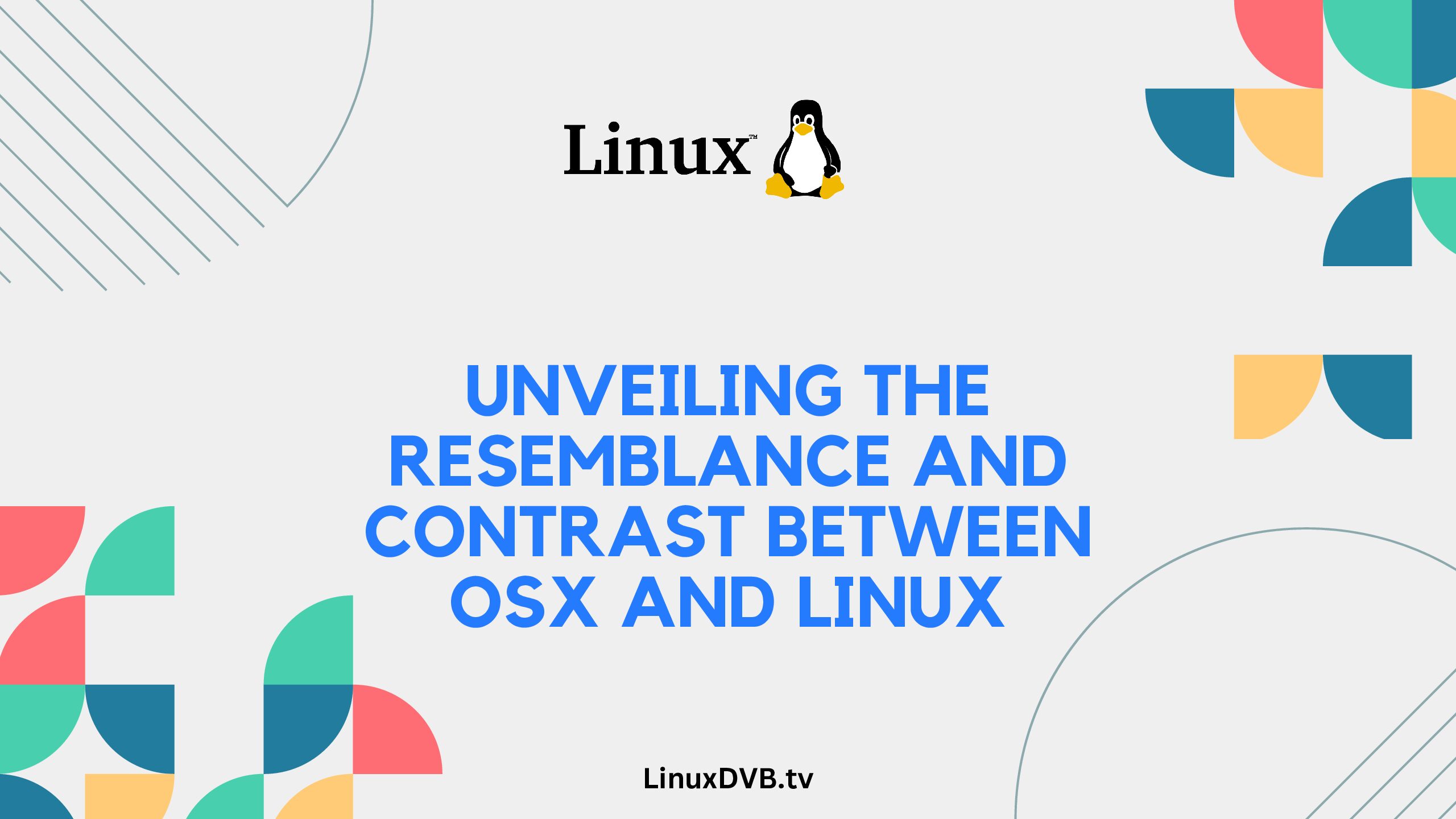When it comes to operating systems, two names stand out in the tech world: OSX and Linux. Both offer powerful features, a dedicated user base, and a unique approach to computing. If you’re wondering, “Is OSX similar to Linux?” you’ve come to the right place. In this article, we’ll take you on a journey through the intricacies of these two operating systems, highlighting their similarities, differences, and the aspects that set them apart.
Table of Contents
Introduction: Understanding the Landscape
In the realm of operating systems, OSX and Linux have garnered attention for their distinctive qualities. OSX, developed by Apple Inc., is known for its sleek design, user-friendly interface, and seamless integration with Apple devices. On the other hand, Linux, an open-source project, boasts flexibility, customization, and a passionate community of developers.
Is OSX Similar to Linux? Exploring the Common Ground
While OSX and Linux may seem worlds apart, there are indeed areas where they share common ground:
User Interface and Design
Both OSX and Linux have made user experience a top priority. OSX is acclaimed for its visually appealing interface, characterized by smooth animations and a clean layout. Similarly, many Linux distributions offer customizable interfaces that cater to individual preferences. The common focus on user-centric design is a prominent similarity between the two.
Security Features
Security is paramount in today’s digital landscape. OSX and Linux both prioritize user data protection. OSX’s Gatekeeper ensures that only verified applications can be installed, safeguarding users from potential threats. Linux’s robust permission system grants users control over file access and system processes, enhancing overall security.
Command-Line Interface (CLI)
For tech enthusiasts and developers, the command-line interface is a crucial tool. OSX and Linux embrace this feature, offering powerful command-line terminals. Linux, being open-source, provides extensive command-line options and scripting capabilities. OSX’s Terminal, while user-friendly, still offers advanced capabilities for those seeking more control.
Multitasking and Performance
Multitasking is a cornerstone of modern computing. OSX’s Mission Control enables users to manage multiple windows and applications seamlessly. Linux distributions like Ubuntu also excel in multitasking, with virtual workspaces and efficient resource management.
Where OSX and Linux Diverge
While there are notable similarities, it’s essential to acknowledge the differences that set OSX and Linux apart:
Kernel and System Architecture
At their core, OSX and Linux use different kernels. OSX employs the XNU kernel, a hybrid of Mach microkernel and BSD components. Linux, on the other hand, uses the Linux kernel. This fundamental difference influences how the operating systems handle tasks, device drivers, and system interactions.
Software Compatibility
Software availability can be a determining factor for users. OSX primarily supports applications available on the Apple App Store. Linux, with its open-source nature, provides a wide range of software choices from various repositories. This diversity gives Linux an edge in terms of customization.
Commercial vs. Open Source
One of the most significant distinctions lies in their development models. OSX is a proprietary operating system developed by Apple, with a closed-source codebase. Linux, being open-source, encourages collaboration and community-driven development. This open nature contributes to Linux’s widespread adoption, particularly in server environments.
FAQs About OSX and Linux Similarities and Differences
Can I run Linux software on OSX?
While it’s not native, tools like Homebrew allow you to install many Linux software packages on OSX.
Does OSX have a terminal like Linux?
Yes, OSX comes with Terminal, a command-line interface similar to Linux.
Is Linux more secure than OSX?
Both have strong security features, but Linux’s open-source nature often leads to quicker vulnerability fixes.
Can I install OSX on any PC like Linux?
No, OSX is designed to run exclusively on Apple hardware, unlike Linux which is more versatile.
Which is better for developers, OSX or Linux?
It depends on your preferences. OSX offers a polished development environment, while Linux provides extensive customization.
Is Linux free like OSX?
Yes, most Linux distributions are open-source and can be downloaded and used free of charge.
Is iOS the same as Linux?
No, iOS and Linux are different; iOS is Apple’s mobile operating system, while Linux is a versatile kernel powering various operating systems.
Is OSX similar to Linux?
OSX (now macOS) and Linux share some similarities, but they are distinct operating systems.Why is macOS and Linux so similar?
macOS and Linux share Unix-like roots and design principles, leading to similarities in their command-line interfaces and underlying architecture.What does Mac use instead of Linux?
Mac uses its proprietary Unix-based operating system, macOS, instead of Linux.What is the difference between Linux and macOS kernel?
The Linux kernel is open-source and widely used in various distributions, while macOS uses a closed-source kernel developed by Apple specifically for its hardware.How similar is Linux to Mac?
Linux and macOS share similarities due to their Unix-like heritage, but they are distinct operating systems with different kernels and user experiences.Conclusion: Embracing Diversity in Operating Systems
In the realm of operating systems, the question “Is OSX similar to Linux?” doesn’t have a straightforward answer. While they share certain traits, they also possess distinct qualities that cater to different user needs. OSX’s seamless integration with Apple’s ecosystem and Linux’s customizability both contribute to their respective appeal. As you explore the possibilities of these operating systems, you’ll likely find that each has its strengths and unique offerings.

